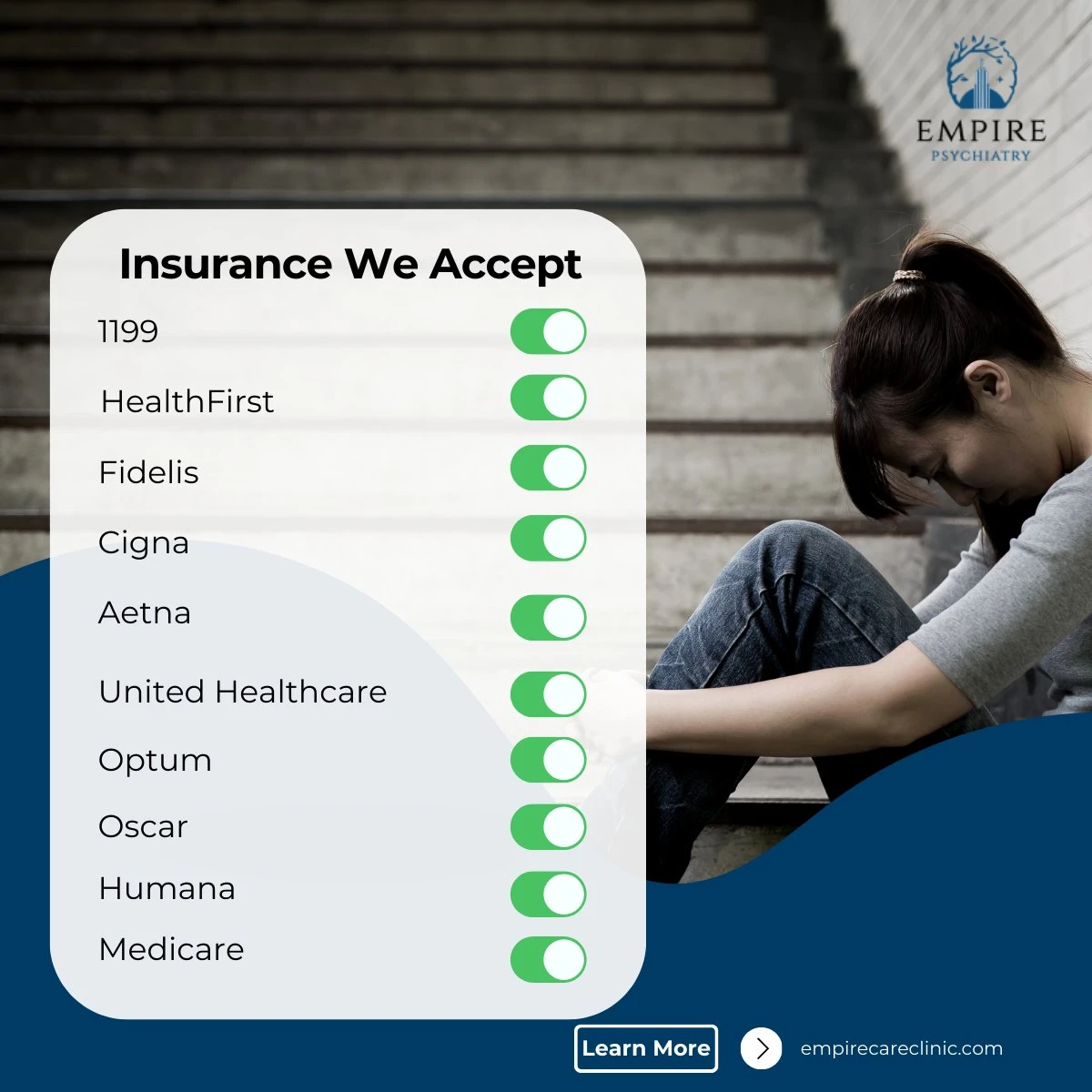Taking the first step toward better mental health can feel daunting, but support and guidance are available. Whether searching for answers or simply curious, many families want to understand what’s involved in psychiatric evaluations & insurance benefits in Glen Head. This guide was created to help local residents feel prepared, empowered, and informed so moving forward feels both natural and achievable.
What Happens During a Psychiatric Evaluation?
A psychiatric evaluation is like a check-up for mental health. Most people get one when they have emotional or behavioral challenges, or when a mental health condition is suspected.
- During a psychiatric evaluation, a licensed provider such as a psychiatrist, psychiatric nurse practitioner (PMHNP), or other qualified clinician will ask about symptoms, medical history, and any medicines currently used. The process usually starts with forms, covering medical and mental health history. Be honest and open. Honesty helps the provider tailor the support to each person’s needs.
- An intake interview comes next. The provider asks about symptoms, how long they have been present, and how they affect daily life. Family background, social circumstances, and past treatments may come up, too.
- The provider will then perform a mental status exam. This is a series of questions and sometimes simple tasks. These help assess thinking, memory, mood, and communication skills.
- Afterward, the provider puts together all the information, making any necessary diagnoses of psychiatric disorders, such as bipolar disorder, PTSD, OCD, or mood disorders. Together, the provider and patient create a personalized psychiatric treatment plan. This plan could include psychotherapy services (like CBT or psychodynamic therapy), medication management, or supportive psychotherapy.
Why Are Psychiatric Evaluations Important?
Psychiatric evaluations help clinicians understand the full picture of mental health. Both strengths and struggles. For many, it’s the first step toward effective treatment. A clear diagnosis allows for a tailored treatment plan that meets individual needs.
Evaluations are not just for new problems. Sometimes, those already in mental health care. Whether through outpatient psychiatry, telehealth services, or therapy need an updated assessment. This helps monitor progress and adjust the treatment plan if symptoms or life situations change.
Early evaluation and intervention can greatly improve outcomes. Individuals who reach out for help sooner tend to see better results over time.
How Long Does a Psychiatric Evaluation Take?
Most evaluations last between two and four hours, depending on the complexity of the case and the number of concerns being addressed. For some, it may be shorter. For others, particularly those with several psychiatric disorders or a long history, the evaluation could extend to more than one session.
The assessment involves direct conversations, questionnaires, and sometimes formal tests to check cognitive function and emotional wellbeing. Providers including board-certified psychiatrists, psychiatric-mental health nurse practitioners (PMHNP-BC), or advanced practice registered nurses take their time to ensure a thorough and comprehensive understanding.
What Questions Will Be Asked?
Expect questions about:
- Emotional symptoms (anxiety, sadness, mood swings)
- Behavior changes or challenges (sleep, appetite, concentration)
- Lifelong mental health history (personal and family)
- Past diagnoses or treatments, including psychiatric medications
- Stressors and major life changes (work, relationships, trauma)
- Alcohol or substance use disorders
- Cultural, religious, and social background
These questions are not meant to judge, but to understand. Providers want to know the full story to give the best possible care with evidence-based care and personalized treatment plans.
Special Considerations for Adolescents and Children
Children and adolescents in Glen Head can also receive psychiatric assessments. The process may involve parents or guardians. Providers often ask about school performance, peer relationships, and development milestones. Observations from caregivers help get a full sense of the child’s behavior and needs.
Child and adolescent psychiatry requires collaboration with caregivers, teachers, and sometimes a primary care physician. A board-certified psychiatric nurse practitioner or psychiatrist may also recommend cognitive behavioral therapy, talk therapy, or family therapy to help adolescents and young adults build coping skills and resilience.
What Treatments Are Recommended After a Psychiatric Evaluation?
Treatment after an evaluation is always individualized. Most commonly, recommendations may include:
- Psychotherapy services with a therapist (CBT, psychodynamic, or DBT)
- Medication management and psychiatric medications, prescribed by psychiatrists, nurse practitioners, or physician assistants
- Support groups or family therapy
- Coordination with other health care providers
- Referrals for more specialized testing, if needed
Providers work together with each individual to adjust treatment over time. Support is ongoing and changes as needs evolve. Mental health care is a journey, not a one-time fix.
How Does Insurance Work for Psychiatric Evaluations in Glen Head?
Insurance coverage for mental health including psychiatric evaluations is strong in New York State. By law, most insurance plans must cover psychiatric services the same as medical care. This is often called “behavioral health parity.”
Most plans, including Blue Cross, Blue Shield, and other private or public insurance plans, will pay for psychiatric evaluations, psychotherapy and psychopharmacology, and telehealth services. Copays and deductibles are typically similar to those for physical health appointments.
To use insurance:
- Confirm that the provider is in-network with the insurance plan
- Call the plan to check coverage for psychiatric services
- Be aware of any requirements, such as referrals or pre-authorizations
- Review the explanation of benefits for details on costs
- Prepare for out-of-pocket costs if using a provider not in-network
What If Insurance Denies Coverage?
If coverage for a psychiatric evaluation or mental health care is denied, don’t panic. There are clear steps to appeal. In New York:
- The insurer must state the reason for denial in writing
- Patients have the right to file an appeal with their insurer
- There is also an option for an independent external review
Tips for Navigating Insurance for Psychiatric Care
- Keep a record of all communications with the insurer, including names, dates, and outcomes
- Ask about coverage limits for therapy, medication management, and evaluation services
- Verify what documentation or referrals are required before the initial appointment
- Double-check network status of the provider and specific plan
- Know the appeal process in advance, just in case
Can Disability Insurance Help With Mental Health Needs?
Some individuals in Glen Head may need support beyond standard health insurance. Disability insurance (public and private) may cover intensive psychiatric care if the condition impacts work or daily function.
New York State disability insurance and some private plans offer benefits for documented mental health conditions, including psychiatric disorders. Qualifications and benefits vary. Always check with your provider or insurance agent.
What Services Does Empire Psychiatry Offer Near Glen Head?
At Empire Psychiatry, we serve the Glen Head community with understanding and care. Our licensed mental health professionals, including psychiatrists, psychiatric nurse practitioners, and therapists, offer comprehensive care:
- Psychiatric evaluations
- Medication management
- Telehealth and outpatient psychiatry
- Personalized psychiatric treatment plans for adolescents and adults
We accept most major insurance plans, making quality mental health support accessible. Our clinicians provide evidence-based care for conditions such as bipolar disorder, OCD and PTSD, mood disorders, and substance use disorders.
Take Charge of Your Mental Health With Us at Empire Psychiatry
Struggling with mental health can be isolating, but seeking help is a sign of strength. Our team at Empire Psychiatry offers guidance, compassion, and years of experience to residents of Glen Head and throughout New York.
Whether searching for psychiatrists nearby, interested in talk therapy, or in need of medication management, we provide comprehensive care. Our clinicians, psychiatric practitioners collaborate to deliver therapeutic, biopsychosocial treatment with personalized care.
We encourage anyone needing support to take the next step. Call us at 516-900-7646 for personalized, professional care. Let us help navigate evaluations, insurance, and ongoing treatment together. Mental health matters and we are here to make care accessible.




